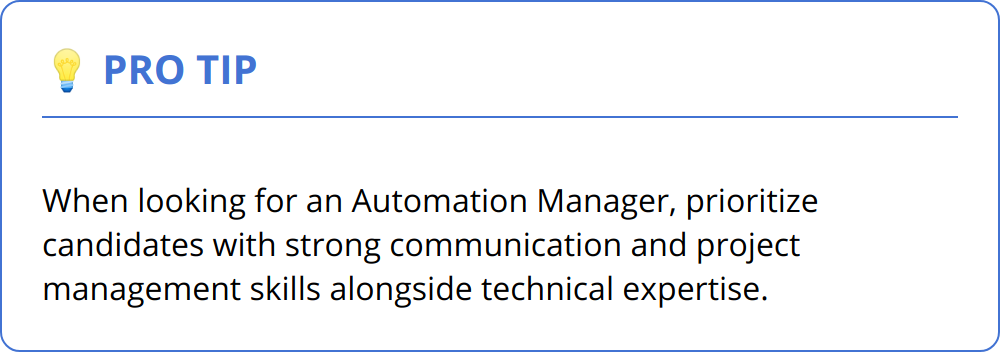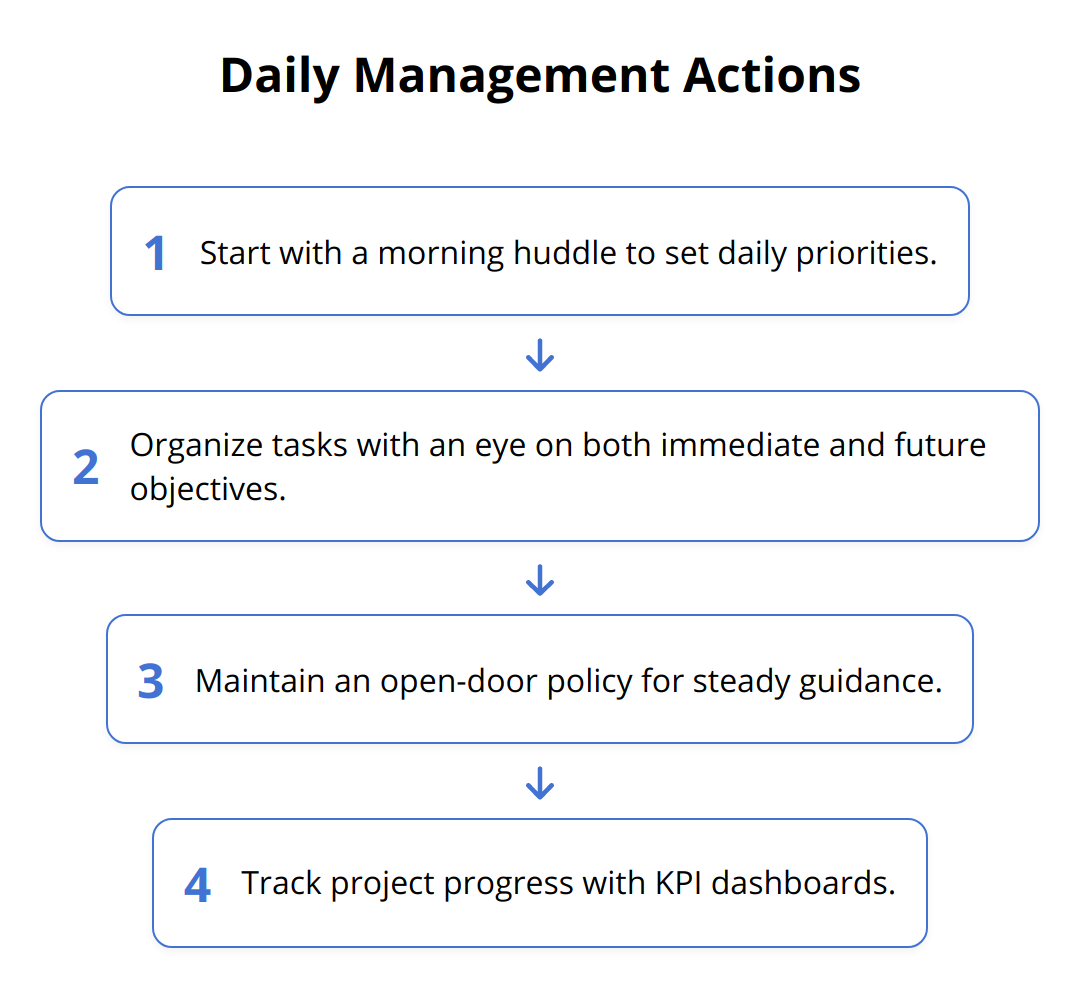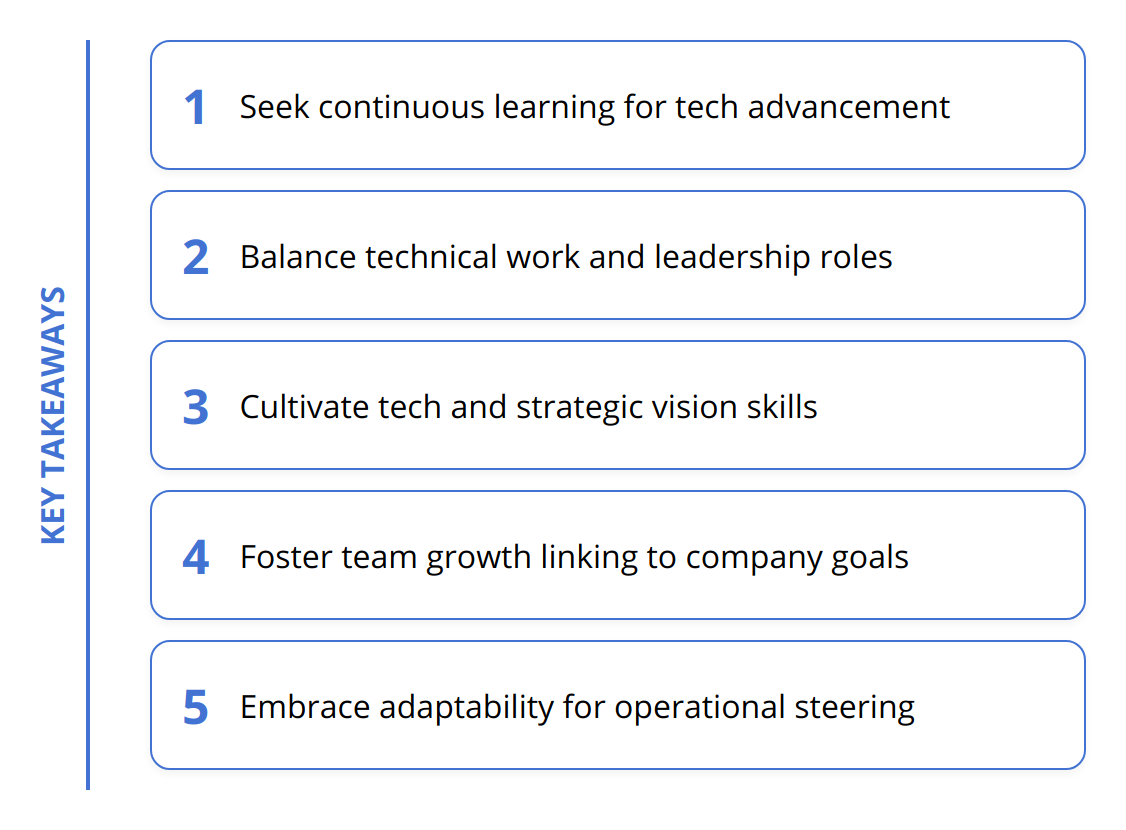Automation is reshaping the workforce, and at the helm of this transformation is the Automation Manager. This pivotal role blends technical savvy with strategic insight to keep businesses at the forefront of efficiency and innovation.
We at Emplibot understand that navigating the intricacies of this position can be complex. Our focus is to elucidate the responsibilities, daily activities, and the increasing significance of Automation Managers across various industries.
Role of an Automation Manager
Automation Managers are the conductors of the digital orchestra in any tech-forward company. Their role is to meld the knowledge of technology with a clear vision for process improvement, boosting productivity and driving innovation. They are the nexus between potential and performance, ensuring that automated systems do not merely exist but thrive and evolve.
Directing the symphony of automated tasks and workflows requires a unique set of skills and a solid educational foundation. Typically, an Automation Manager will hold at least a bachelor’s degree in engineering, computer science, or a similar field, coupled with years of experience in technology and leadership.
A traditional day might include strategizing automation roadmaps, overseeing project timelines, and ensuring the harmony of team dynamics. It’s about creating systems that are understandable for those without engineering PhDs, with an empathetic eye towards user experience. But let’s be clear, this role isn’t for the faint of heart. You’re the one expected to champion the cause of automation, push back on resistance, and blaze the path for digital transformation.
When hunting for the right Automation Manager, you’ll want someone who isn’t just technically proficient—though expertise in the latest automation tools and technologies is a given—but also possesses strong project management skills. Communication, a golden trait in this digital era, is key. An effective Automation Manager communicates with clarity, mitigates risks deftly, and sustains the morale of teams as they navigate the complexities of automated systems.

In terms of roles that walk a similar tightrope, you could look at titles such as Automation Lead or Marketing Automation Manager, each with its own flavor of responsibilities but all under the broad umbrella of simplifying complex processes through tech.
Sure, a playbook containing all you need to know about becoming an unbeatable Automation Manager isn’t available. However, embracing a lifelong learning mentality and being at ease with perpetual change will take you far. Some cornerstones to bear in mind:
-
Cultivate a keen understanding of your industry’s nuances
-
Master the art of juggling various stakeholder expectations
-
Stay agile and adaptable to navigate the ever-changing tech landscape

Remember, while certifications and qualifications are important, the real mettle of an Automation Manager is tested in the field. Do you inspire innovation? Can you keep up with the relentless pace of change in automation technologies? Are you able to articulate the deep technicalities to non-techies? If the answer is a resounding “Yes,” then you just might have what it takes.
So, while there may be a comprehensive guide to implementing automation on paper, the real story begins with the person spearheading the charge. It’s about bridging the gap between potential and actual, ensuring that technology doesn’t just dazzle, but delivers.
The Automation Manager role is dynamic, demanding, and downright indispensable in today’s digital-driven workplace. Grab the baton and lead your team through the intricate and electrifying world of automation.
Navigating Automation Management
Leading the automation team to success is not just about having a firm grasp of the technology; it’s about steering the team in a direction that aligns with the organization’s long-term objectives while balancing daily operations. An Automation Manager must be adept in creating a supportive environment where excellence is the standard, and innovation flourishes.

Steering the Day-to-Day
Every day, the Automation Manager must serve as the guiding force for the team’s activities. It’s essential to maintain a pulse on the team’s dynamics, ensuring that each member is clear on their objectives, has the necessary resources, and is motivated to tackle their projects. Proactive problem-solving is the name of the game, as is the ability to anticipate and mitigate any roadblocks that might throw the team off course.
Consider these practical steps for effective daily management:
-
Kick off with a morning huddle to align on priorities and address any concerns.
-
Structure tasks to accommodate for both short-term deliverables and long-term goals.
-
Implement an open-door policy to encourage team members to seek guidance as needed.
-
Monitor progress through a dashboard that tracks KPIs (Key Performance Indicators) relevant to the current automation projects.

Timing is Everything
For an Automation Manager, constructing and maintaining detailed project timelines is not a task to take lightly. It reflects the team’s ability to deliver on promises and meet expectations, both internal and external. An imposed deadline isn’t just a box to tick; it’s a commitment to efficiency and effectiveness. This calls for scheduling proficiency and a knack for balancing agility with foresight.
To flesh out sustainable timelines, these pointers can help:
-
Utilize project management tools to create transparent, accessible timelines for all stakeholders.
-
Regularly review and adjust timelines based on team feedback and unforeseen challenges.
-
Present clear reports to upper management that highlight both progress and hurdles.
Shaping the Automation Future
Then comes the grand task of formulating the organization’s automation roadmap. It’s more than just a strategic plan; it’s a vision for how automation will unfold over time. The roadmap must encapsulate not only the technology available today but also an outlook on future advancements. The aim is to craft an actionable, forward-thinking guide that underpins the business goals while propelling the company towards gaining a competitive edge.
To build a robust automation roadmap, consider these actions:
-
Evaluate current processes to pinpoint areas ripe for automation.
-
Research industry trends to identify emerging technologies that could provide a strategic advantage.
-
Collaborate with various departments to understand their needs and how automation can resolve pain points.

By focusing on these aspects, the Automation Manager can turn the complex task of automation leadership into an opportunity for stellar performance, growth, and innovation. Remember, in the world of automation, it’s not just about what technology can do; it’s about the strategic integration of these tools to transform operations and elevate the entire business.
Continue exploring this topic by reading about implementing automation solutions to further enhance your understanding.
How Do Automation Managers Drive Industry Innovation?
In the landscape of modern business, the Automation Manager has become the backbone of industry innovation. Their impact is felt across the board, but let’s zero in on three fields: pharmaceutical/biotechnology engineering, product management with AI and ML, and financial technology and services.
Within the pharmaceutical and biotechnology sector, the role of the Automation Manager is transforming the speed and precision of drug development and production. Here, validation and regulatory compliance are non-negotiables, and the Automation Manager ensures these standards are met without compromising efficiency. They implement systems for real-time data analysis, optimizing production lines, and drastically cutting the time for clinical trials.
Efficient automation in pharma/biotech entails:
-
Ensuring GMP (Good Manufacturing Practice) compliance through faultless automation systems.
-
Leveraging data analytics for production and quality control improvements.
-
Fostering an innovation-driven culture to constantly improve processes and outcomes.
As AI and ML carve their niche in product management, Automation Managers in this realm are instrumental in contextualizing these technologies. They exploit AI’s ability to parse vast data repositories for actionable insights, enabling targeted customer experiences. AI-driven automation tools sift through feedback for sentiment and thematic trends, enhancing product iteration and customer satisfaction.
Here’s how Automation Managers boost product management:
-
Develop AI strategies that align with customer needs and business goals.
-
Stay versed in the latest AI and ML advancements to outpace competitors.
-
Craft collaboration models between product teams and data analysts for richer, more relevant product features.
In the world of fintech and financial services, Automation Managers are at the heart of disrupting traditional banking and investment processes. They have to be dynamic in their approach, balancing the stringent requirements of financial reporting with the innovative possibilities of tech like blockchain and smart contracts. Their role ensures financial transactions are more secure, efficient, and transparent, a key selling point in this digital age.
To push the boundaries of financial technology, an Automation Manager should:
-
Prioritize automation that enhances financial data accuracy and reconciliation.
-
Create a system for streamlining operations to improve customer and user experience.
-
Understand regulatory boundaries and leverage automation to ensure compliance.
In conclusion, regardless of the industry, Automation Managers are pivotal in not only identifying areas where automation can amplify business outcomes but also in spearheading the creation of systems that redefine what’s possible. They are futurists and realists, visionaries and executors, and the linchpin of a company’s innovative drive.
As you continue to explore the potential and power of automation, take time to understand the integration of automation as this knowledge is essential for any driven Automation Manager.
Facing Automation Challenges
Automation Managers constantly navigate a technology landscape that never stands still. With digital advancements occurring at breakneck speed, a critical challenge is staying updated and integrating new technologies effectively. While technical expertise is crucial, it’s equally important to lead teams with a strong vision and to nurture their professional growth. Below are ways Automation Managers can tackle these challenges head-on.
Staying Ahead in Tech
The rapid evolution of technology requires Automation Managers to be lifelong learners. They must keep their knowledge fresh and stay ahead of trends, often by mastering new programming languages or automation tools before they become mainstream. This doesn’t only mean enrolling in courses or attending workshops; it’s also about engaging with online communities where cutting-edge ideas are shared. By doing so, managers can avoid falling behind and can better prepare their teams for what’s next.
Balancing Technical Skills and Leadership
An Automation Manager must be an excellent technologist and a leader. Striking this balance isn’t easy. They need to drive technical excellence while also spearheading strategic planning and team management. This requires a flexible mindset. One practical approach is dedicating specific times for deep work on technical aspects and other times for leadership duties like coaching and strategic meetings. Being organized and setting clear boundaries helps maintain this balance.
Fostering Team Success and Personal Growth
Leading a team isn’t just about getting the job done; it’s about ensuring team members are growing, too. This means providing opportunities for continuous learning and career development. It’s wise to set up regular one-on-one meetings to discuss individual career paths and to link these with team targets. Automation Managers can help their team members identify their strengths and how to leverage them for team success and personal satisfaction.
Actionable Insights
To put these insights into practice, consider these tips:
-
Stay updated: Subscribe to leading tech podcasts or newsletters to catch the latest tech wave.
-
Keep learning: Allocate time weekly for personal development and encourage your team to do the same.
-
Schedule wisely: Divide your week into blocks for technical work and for leadership tasks to manage your dual role effectively.
-
Nurture growth: Tailor personal development plans for each team member linking to team goals.
These challenges demand attention and agility, but with a proactive mindset, Automation Managers can lead their teams to success and drive the industry forward. To gain deeper insights into balancing leadership roles and technical expertise, you might find value in our article on managing multi-channel marketing automation.
Move through these challenges with confidence, knowing that every obstacle is an opportunity to further hone your management skills and secure your place as an indispensable leader in the ever-evolving field of automation.
Final Thoughts
Automation Managers play a critical role in shaping the future of business. They are pivotal in driving efficiency and fostering innovation within organizations. As businesses continue to place a higher value on automation for success, the role of the Automation Manager becomes increasingly significant.

We have seen that Automation Managers are not only responsible for understanding and deploying cutting-edge technology but also for managing the delicate balance between leadership and technical expertise. They orchestrate teams to create systems that transform operations and lay the groundwork for sustained competitive advantage.
For those looking to step into this vital role, it’s imperative to develop a diverse skill set—one that merges technical know-how with strategic vision. Continuous learning and adaptability are the keys to staying relevant in this rapidly evolving field. Here are some actionable steps:
-
Seek knowledge continuously to stay on top of technological advancements
-
Enhance leadership skills to inspire and guide teams effectively
-
Embrace change and be ready to steer operations in new directions
As businesses increasingly rely on automation for their operations, the demand for skilled Automation Managers is bound to rise. It’s an exciting time for those who are up for the challenge. For aspiring Automation Managers, there’s an abundance of opportunity to make a significant impact and to be part of the force that is steering companies towards brighter, more efficient futures.
It is also vital to understand that in the realm of automation, high-quality content plays a substantial role in communicating value and engaging with stakeholders. Tools like Emplibot can empower businesses to maintain a dynamic online presence through SEO-friendly articles on their sites—effortlessly. Keeping up with industry news, trends, and insights becomes seamless with services like Emplibot, designed to streamline content-driven strategies.
The time to sharpen your skills and embrace the role of Automation Manager is now. With businesses seeking to optimize operations and drive growth through technological advancements, being at the forefront of automation management isn’t just a career—it’s a passport to crafting the future of industry.

